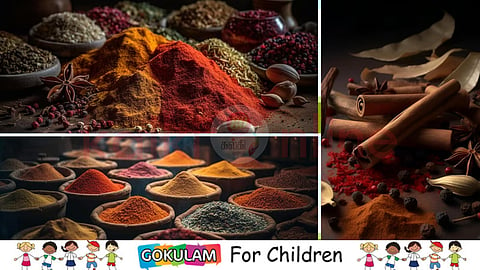
- முகப்பு
- கல்கி
- மங்கையர் மலர்
- தீபம்
- கோகுலம்/Gokulam
- முக்கிய பிரிவுகள்முக்கிய பிரிவுகள்
- தொகுப்புகள்தொகுப்புகள்
- PremiumPremium

- Mangai Jaikumar
We, in India, are not just culturally rich but also rich in our spices and flavours. India has a plethora of spices that are ground, powdered dried, soaked or used as they are to create some of the most special delicacies in the country. Each region in the country has its own secret mix of spices to enhance the flavour and colour of dishes. For example, Sambhar in Karnataka is very different from how it is made in Tamilnadu and Kerala. That's why the spices are called the ‘heartbeat’ of a kitchen, especially Indian kitchens!
Spices are fascinating condiments. They wrap within them a sea of flavours that adds magic to almost every dish, turns even an unexciting dish into culinary masterpiece! Spices are distinguished from herbs, which are the leaves, flowers, or stems of plants used for flavouring or garnishing. Many spices have antimicrobial properties that explain why spices are more commonly used in warmer climates.
A spice may be available in fresh or dried form. A fresh spice, such as ginger, is usually more flavourful than its dried form. Fresh spices are more expensive and have a shorter shelf life than dried spices. Small seeds, such as fennel and mustard seeds, are often used both whole and in powder form. The flavour of a spice is maximised by storing it whole and grinding when needed. Early uses of spices were connected with magic, medicine religion, tradition and preservation.
Spices were among the most demanded and expensive products, the most common being black pepper cinnamon, cumin, nutmeg, ginger and cloves. Spices were imported from plantations in Asia and Africa, which made them expensive. The most expensive was saffron, used for its colour and flavour.
Spices, when used in larger quantity, can also contribute a substantial amount of minerals and other micronutrients, including iron, magnesium, calcium etc… to the diet. However, as life becomes more complex, spices have fallen into obscurity and we have lost some delicious flavours; along with that the wisdom in healthy eating.
Spicy facts on spices:
The ancient Indian epic Ramayana has a mention on cloves.
In the story of Genesis, Joseph was sold into slavery by his brothers to spice merchants.
In the biblical poem Song of Solomon, the male speaker compares his beloved one to many forms of spices.
The spice-producing regions were the main attractions for Portuguese navigator Vasco da Gama to sail to India in 1499 .
